Indices, Index Funds And ETFs: Exploring HCI, Nonlinear Risk and Homomorphisms (1st ed. 2018)
By:
Sign Up Now!
Already a Member? Log In
You must be logged into Bookshare to access this title.
Learn about membership options,
or view our freely available titles.
- Synopsis
- Indices, index funds and ETFs are grossly inaccurate and inefficient and affect more than €120 trillion worth of securities, debts and commodities worldwide. This book analyzes the mathematical/statistical biases, misrepresentations, recursiveness, nonlinear risk and homomorphisms inherent in equity, debt, risk-adjusted, options-based, CDS and commodity indices – and by extension, associated index funds and ETFs. The book characterizes the “Popular-Index Ecosystems,” a phenomenon that provides artificial price-support for financial instruments, and can cause systemic risk, financial instability, earnings management and inflation. The book explains why indices and strategic alliances invalidate Third-Generation Prospect Theory (PT3), related approaches and most theories of Intertemporal Asset Pricing. This book introduces three new decision models, and some new types of indices that are more efficient than existing stock/bond indices. The book explains why the Mean-Variance framework, the Put-Call Parity theorem, ICAPM/CAPM, the Sharpe Ratio, Treynor Ratio, Jensen’s Alpha, the Information Ratio, and DEA-Based Performance Measures are wrong. Leveraged/inverse ETFs and synthetic ETFs are misleading and inaccurate and non-legislative methods that reduce index arbitrage and ETF arbitrage are introduced.
- Copyright:
- 2018
Book Details
- Book Quality:
- Publisher Quality
- ISBN-13:
- 9781137447012
- Related ISBNs:
- 9781137447005
- Publisher:
- Palgrave Macmillan UK, London
- Date of Addition:
- 03/18/19
- Copyrighted By:
- Springer
- Adult content:
- No
- Language:
- English
- Has Image Descriptions:
- No
- Categories:
- Nonfiction, Business and Finance
- Submitted By:
- Bookshare Staff
- Usage Restrictions:
- This is a copyrighted book.
